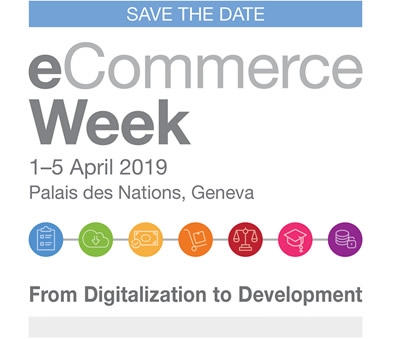Stengthening MSMEs and creating jobs through digital industralisation: What policies work?
4 Apr 2019 13:15h - 14:45h
Event report
[Read more session reports and live updates from the UNCTAD E-commerce Week]
The session was moderated by Mr Parminder Jeet Singh (Executive Director, IT for Change, with ECOSOC Special Consultative Status). He asked how empowering micro-, small- and medium-sized enterprises (MSMEs) in global trade should boost job creation and promote more inclusive economic growth. He said that the session has to analyse the questions: What is digital industrialisation? What are some of the specific, effective policies through which developing countries can promote MSMEs and foment jobs through digital industrialisation? He mentioned that data is a local digital resource and value. In addition, he said that technology flows are very different to data flows.
Mr Michael Akuupa (Director, Labour Resource and Research Institute) explained that new technology will shape the global economy. He talked about automation in the labour sector. He asked if African countries are on time in digital industrialisation. Where is the African position in the fourth industrial revolution? In addition, he noted the importance of national policies and laws. According to him, they must be the tools to take advantage of the digital economy. Moreover, Akuupa noted the manufacturing issue and the key role played by MSMEs in addressing it. He said that there is still digital fragmentation in the labour sector. Answering a question from the audience, he said that we need to have a strong data protection policy and highlighted the role of policy implementation.
Ms Rashmi Banga (Senior Economic Affairs Officer, Unit on Economic Cooperation and Integration among Developing Countries, UNCTAD) highlighted digital industrialisation policies. She explained the situation of the growing digital divide and loss of trade competitiveness. In addition, she said that countries need to build digital infrastructure. According to her, countries have to build information and communication technology and broadband infrastructure, data infrastructure through ‘devising national data regulatory policies’, digital skills, and competencies, etc.
Banga mentioned examples of ownership of data: ‘Rwanda’s Data Revolution Policy’ and ‘India’s Draft National E-commerce Policy’. She noted the importance of data localisation and building data centres. She encouraged digital technology transfers from foreign firms, regulating trade in e-transmission, and policy space for digital industrialisation strategies. She also added the role of a moratorium on e-transmissions and emphasised the free flow of data. She concluded by highlighting suggestions for developing countries: building a regional data economy, promoting digital start-ups, drawing up digital industrial policies, developing digital competencies, and developing national marketing platforms.
Mr Martin Luther Munu (Research Analyst, Trade and Regional Integration Economic Policy Research Centre (EPRC)) spoke about trade and digitalisation. He said that digitalisation is a key trade facilitation platform (digitalisation fuels trade). He added that MSMEs are classified according to number of employees, revenue, and turn over or total assets. In addition, he gave the example of classification of MSMEs in Uganda and said that Apple, Samsung, Amazon, and Facebook still dominate global digital trade.
Furthermore, Munu said that Africa’s share of global trade is minimal (less than 3 percent). Intra-African trade remains low compared to that of other continents (although regional integration has increased trade). According to him, individual use of the Internet, as a percentage of the population, is a big challenge faced by Africa. He talked about the push for binding rules on e-commerce. The Africa Group, in recognition of the structural challenges in the continent, is opposed to this move. He noted Nigeria and Kenya as African countries that have joined the friends of e-commerce initiative.
Munu said that we need to develop and implement digital industrial policies and facilitate technological transfer. He emphasised the agreement with the Africa Group position on e-commerce initiative. He concluded with the thought that protection of the policy space for digital industrialisation and a push for the role of the state in development would be beneficial.
Answering a question from the audience, he mentioned that cross-border trade would improve digital trade. He emphasised privacy, connectivity, and digital industrial policy as the tools to transform the digital economy.
Mr Abhijit Das (Head, Centre for WTO Studies, Indian Institute of Foreign Trade, New Delhi) started by explaining opportunities for MSMEs in e-commerce. He noted selling goods on digital platforms. The challenges are the high cost of Internet connectivity, lack of digital infrastructure in developing countries, and that MSMEs may be less digitally connected than large firms. In addition, he mentioned that high speed Internet is rarely available to most MSMEs on a reliable basis. Furthermore, Das described the landscape in India. He said that India’s Internet economy is set to double by 2020. The MSMEs dominate the national market. He talked about what needs to be done to help MSMEs: improving digital infrastructure, assessing constraints, hand-holding MSMEs to facilitate on-boarding, creating Customs clearance facilities in post offices in large MSME clusters, and more simplified return policy.
In conclusion, he outlined the challenges for data-based MSMEs and what can be done. He explained that digital giants provide some data, but successful MSMEs come under pressure to sell their business. He mentioned the need for a ‘National MSME Innovation Fund’.
By Gilles D. Bana
Related topics
Related event

eCommerce Week 2019: From Digitalization to Development
1 Apr 2019 15:45h - 5 Apr 2019 15:45h
Geneva, Switzerland
